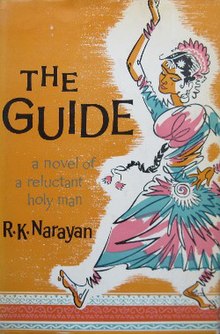Plot summary
The protagonist, Raju, who is nicknamed "Railway Raju", is characterized as being a corrupt and popular tour guide. In the story, he falls in love with a beautiful woman named Rosie, who is married to an archaeologist named Marco, while the couple is visiting Malgudi as tourists. Marco disapproves of Rosie's passion for dancing but Raju encourages Rosie to pursue her dreams and become a dancer. With this interaction, they begin to spend time with each other and become very close.
Upon learning about their relationship, Marco leaves Rosie in Malgudi and returns to Madras alone. Rosie seeks refuge at Raju's home, and they start living together. However, Raju's mother does not approve of their relationship and leaves them.
Raju becomes Rosie's stage manager, and with his marketing tactics, Rosie gains recognition as a dancer. With his success, Raju becomes overly confident and begins to assert more control over Rosie's life for financial gain. He becomes involved in a forgery case related to Rosie's signature. Raju is sentenced to two years in prison, despite Rosie's defence.
After completing his sentence, Raju passes through a village called Mangal, where he is mistaken for a sadhu (a spiritual guide). To avoid returning to Malgudi in disgrace, he decides to stay in an abandoned temple near Mangal. There, he takes on the role of a sadhu, delivering sermons and solving the villagers' daily problems and disputes.
During a famine in the village, some of the villagers request help from Raju, believing that rain will come and end the famine if he fasts. Raju decides to confess his entire past to Velan, who had initially discovered him in the temple and had unwavering faith in him like the rest of the villagers. However, Velan remains unchanged by the confession, and Raju resolves to continue with the fast.
As news of Raju's fast spreads through the media, a large crowd gathers to witness the spectacle, much to Raju's annoyance. On the morning of the eleventh day of his fast, he goes to the riverside as part of his daily ritual. He senses rain falling in the distant hills and collapses into the water. Whether it actually rained or if Raju died remains unknown and open to the reader's interpretation.
This page is based on this
Wikipedia article Text is available under the
CC BY-SA 4.0 license; additional terms may apply.
Images, videos and audio are available under their respective licenses.
